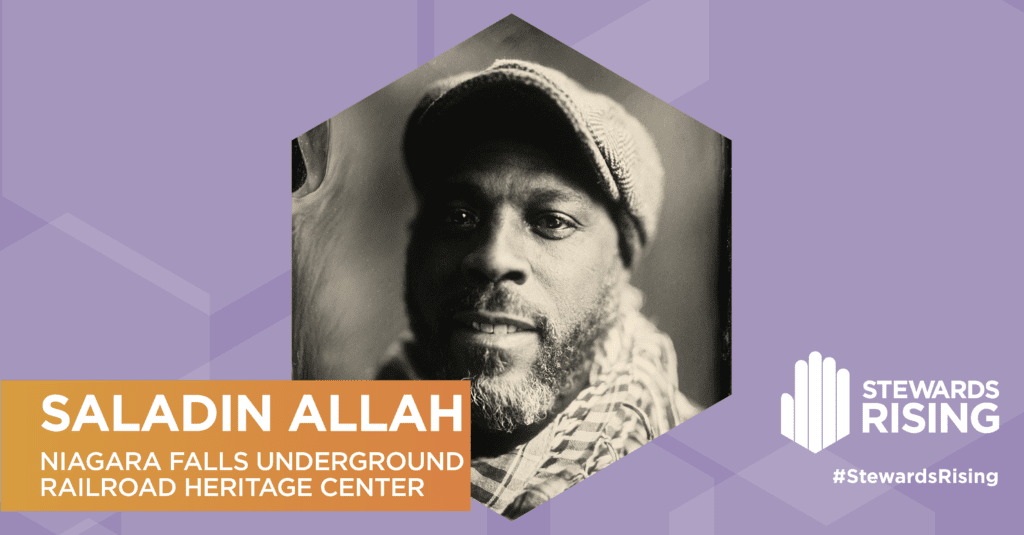Youth Are the Heroes We Need

Saladin Allah, Director of Community Engagement, Niagara Falls Underground Railroad Heritage Center
Stewards across the country are imagining, inspiring, and building a movement to thrive together. Through their actions and their words, they are making the case for an equitable and thriving future in their communities and bringing others into the work. Here, Saladin Allah, whose work spans continents and generations, shines a light on a central force needed for sustainable change: youth.
To listen to Saladin Allah speak about how to build the will to thrive is to listen to the wisdom of a captivating storyteller.
In fact, he is. Saladin is an award-winning producer, educator, and author born in Niagara Falls, NY. He is also the third great-grandson of underground railroad Freedom Seeker Josiah Henson, whom Harriet Beecher Stowe used as the primary narrative for her famous 19th-century novel, Uncle Tom’s Cabin.
"An important part of this work is the transition of bystanders becoming upstanders."
- Saladin Allah
Of all his roles, Saladin credits his 20 years of experience in education and early childhood development for allowing him to see the potential that youth have to guide a thriving future. As a youth advocate, he has created numerous projects, programs, and initiatives that support the growth and development of youth and families worldwide, including founding his own early childhood center, the Atlantis School for Gifted Youngsters in his hometown.
Just as his ancestor’s voice speaks through Stowe’s historic novel, Saladin is amplifying the voices of today’s generation to strengthen their ability to see themselves as heroes of their own stories.
“They have many of the answers and represent the hope of our future,” Saladin said. “But oftentimes people are not invested in their voice.”
Saladin is setting out to change that. He recognizes that youth have a major role to play in system change due to their grasp of technology and its exponential growth. But for youth to affect the future, they have to understand the past.
“Trusting that our younger generations have the capacity to create a world that we have not even seen yet, and also informing them about how systems have traditionally worked, is an important part of [system change],” he said. “They may not see any value in the way some systems and institutions have been set up. But the irony of it is, as younger people, you're literally benefiting from those systems and those institutions. So there had to be something good in there.”
Saladin believes elders need to shift perspectives as well.
“On the flip side, many [people from the] younger generations are the ones who created the advancements in technology that allow the older generation to have access to ways of living, health, and wellness that wouldn't exist without their innovation.”
Bringing generations and different viewpoints together to help them understand each other and the value they both bring is essential to Saladin’s vision for thriving together. “I think that there could be a healthy balance of understanding that institutions are important. But they also have to be integrated with a sense of innovation that allows them to be truly sustainable and represent everyone. Investing in our youth is key to every single thing that we do if we really want this movement to be sustainable.”
Sustainability for Saladin is also about creating a spark among every generation to come together to build the will for change.
“An important part of this work is the transition of bystanders becoming upstanders,” he said. “That requires inspiration. It requires empowerment. And it requires education to do that, as well as investing in our youth. They have all the tools that are necessary, including critical thinking skills, and they will have the ability to figure things out. But we have to be able to invest in them and make the work that we do accessible.”
About Saladin Allah
Saladin is the director of community engagement at the Niagara Falls Underground Railroad Heritage Center, public art project coordinator at the Niagara Falls National Heritage Area, a member of the United Nations International Civil Society Working Group for the Permanent Forum on People of African Descent, and founding director of the Atlantis School for Gifted Youngsters.
He is the author of 23 books, five of which are part of a Curatorial Activism archive in the British Library, and a featured historian in the award-winning IMAX film Into America’s Wild and the six-part award-winning docuseries Enslaved, among many other honors.
